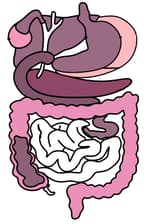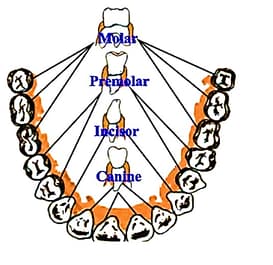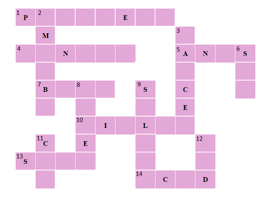Read the following passage carefully and answer the question that follows It.
Bile juice is stored in a sac called, gall bladder, located near its organ of secretion, liver. The gall bladder releases the bile juice into the small intestine whenever food reaches there. Though bile juice is devoid of any digestive enzymes, it is required for the digestion of fats. The fats cannot be digested easily because they are insoluble in water and are present as large globules. Bile juice breaks down big fat droplets into smaller droplets. These are then easily digested by the enzymes released from the pancreas.
Which organ secretes the bile Juice?
Bile juice is stored in a sac called, gall bladder, located near its organ of secretion, liver. The gall bladder releases the bile juice into the small intestine whenever food reaches there. Though bile juice is devoid of any digestive enzymes, it is required for the digestion of fats. The fats cannot be digested easily because they are insoluble in water and are present as large globules. Bile juice breaks down big fat droplets into smaller droplets. These are then easily digested by the enzymes released from the pancreas.
Which organ secretes the bile Juice?

Important Questions on Nutrition in Animals
Read the following passage carefully and answer the question that follows it.
Bile juice is stored in a sac called gall bladder, located near its organ of secretion liver. The gall bladder releases the bile juice into the small intestine whenever food reaches there. Though bile juice is devoid of any digestive enzymes, it is required for the digestion of fats. The fats cannot be digested easily because they are insoluble in water and are present as large globules. Bile juice breaks down big fat droplets into smaller droplets. These are then easily digested by the enzymes released from the pancreas.
Why is digestion of fats difficult as compared to that of other nutrients?
Read the following passage carefully and answer the question that follows it.
Bile juice is stored in a sac called, gall bladder, located near its organ of secretion, liver. The gall bladder releases the bile juice into the small intestine whenever food reaches there. Though bile juice is devoid of any digestive enzymes, it is required for the digestion of fats. The fats cannot be digested easily because they are insoluble in water and are present as large globules. Bile juice breaks down big fat droplets into smaller droplets. These are then easily digested by the enzymes released from the pancreas.
How does bile juice help in digestion of fat?
Read the following passage carefully and answer the question that follows it.
Bile juice is stored in a sac called, gall bladder, located near its organ of secretion, liver. The gall bladder releases the bile juice into the small intestine whenever food reaches there. Though bile juice is devoid of any digestive enzymes, it is required for the digestion of fats. The fats cannot be digested easily because they are insoluble in water and are present as large globules. Bile juice breaks down big fat droplets into smaller droplets. These are then easily digested by the enzymes released from the pancreas.
Where is the digestion of fat completed?
Read the following passage carefully and answer the question that follows it.
Bile juice is stored in a sac called, gall bladder, located near its organ of secretion, liver. The gall bladder releases the bile juice into the small intestine whenever food reaches there. Though bile juice is devoid of any digestive enzymes, it is required for the digestion of fats. The fats cannot be digested easily because they are insoluble in water and are present as large globules. Bile juice breaks down big fat droplets into smaller droplets. These are then easily digested by the enzymes released from the pancreas.
Does bile juice digest fat completely?

Write the name of the following parts and label them in given figure.
(a) The largest gland in our body.
(b) The organ where protein digestion starts.
(c) The organ that releases digestive juice into the small intestine.
(d) The organ where bile juice gets stored.
Open your mouth, look into a mirror and try to count the different types of teeth in your mouth. Compare them with figure given below:.

Record your observations in the table below:
|
Types of Teeth |
Number of Teeth |
|
|
in my mouth |
In the figure |
|
|
Incisors |
|
|
|
Canines |
|
|
|
Premolar |
|
|
|
Molar |
|
|
(a) Did you observe any difference In the number of teeth? If yes, could you Identify which type of teeth showed the difference?
(b) Compare the number and type of teeth In an adult (say your parents or cousins who have reached the age of or more). Note your observation.
Solve the crossword given.

Across
1. Cream-coloured digestive gland.
4. Organ that mixes saliva with the food.
5. Point of defecation.
7. Stored in gall bladder.
10. Finger-like outgrowth in the small intestine.
13. Kind of taste buds.
14. Kills bacteria in the stomach.
Down
2. Feeds with the help of pseudopodia
3. Undigested excretory solid residues.
6. Total number of molars in one jaw of an adult
8. Largest gland
9. Watery secretion in the mouth
11. A ruminant
